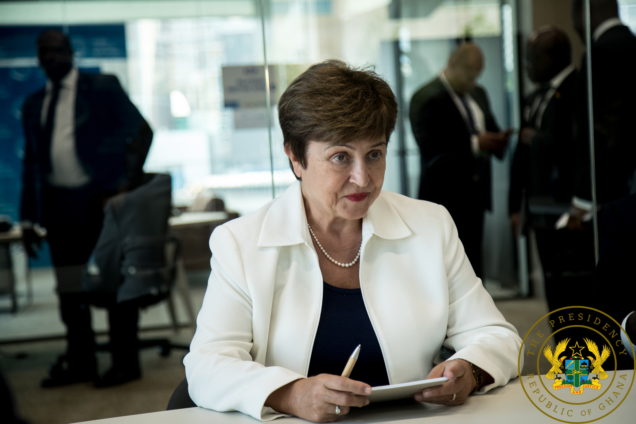
Audio By Carbonatix
The International Monetary Fund (IMF) Executive Board has completed the third review of Ghana’s 36-month, $3 billion Extended Credit Facility (ECF) program, initially approved in May 2023.
The review’s conclusion paves the way for an immediate disbursement of Special Drawing Rights (SDR) 269.1 million (approximately $360 million), bringing total disbursements under the program to around $1.9 billion.
According to the IMF, Ghana’s economic reforms and policy adjustments under the program have produced encouraging outcomes.
Deputy Managing Director Bo Li noted that the country’s economic strategy is “delivering on its objectives,” with key indicators such as growth and fiscal performance showing improvement.
“The economy is showing clear signs of stabilisation,” Li said.
The program has provided a framework for macroeconomic policy adjustments and significant reforms aimed at restoring stability, ensuring debt sustainability, and fostering inclusive growth. Key achievements highlighted include:
• Macroeconomic Recovery: Despite challenges, Ghana has seen rapid growth recovery, declining inflation (albeit slower than anticipated), and improved fiscal and external positions.
• Public Debt Restructuring: Ghana successfully restructured its domestic debt and Eurobonds in line with program parameters. Engagements with external creditors for further restructuring remain ongoing.
• Fiscal Discipline: The government has achieved a primary surplus of 0.5% of GDP and is targeting a 1.5% surplus by 2025. These goals will rely on domestic revenue mobilization, rationalising non-priority expenditures, and expanding social support programs for vulnerable groups.
The Bank of Ghana’s prudent monetary policy has contributed to inflation reduction and the rebuilding of international reserves.
Efforts to stabilise the financial sector include measures to promote recapitalisation and bolster the viability of state-owned and private banks.
Bo Li emphasised the importance of sustained reform implementation to address structural vulnerabilities, especially in sectors like energy and cocoa, and to solidify Ghana’s fiscal framework.
“Staying the course of fiscal policy adjustment before and after the elections is paramount,” Li stressed, adding that this would support social programs and enhance the country’s economic resilience.
Looking ahead, the IMF urges Ghana to:
• Strengthen tax administration and expenditure control.
• Modernize fiscal responsibility frameworks.
• Tackle challenges in the energy sector to mitigate fiscal risks.
• Enhance governance and transparency to attract private sector investment and create jobs.
The IMF reaffirmed its commitment to supporting Ghana’s path to sustainable growth, stating that steadfast reform implementation is critical to achieving long-term macroeconomic stability and poverty reduction.
Latest Stories
-
Lands Minister refutes claims of missing seized excavators, unveils tracking system
3 minutes -
Ghana set to launch National AI Strategy to boost local innovation – Sam George
4 minutes -
PURC gives ECG 48 hours to fix prepaid metering concerns
7 minutes -
Makola No. 2 Market managers justify rent increase amid traders’ protests
9 minutes -
Mahama to deliver 2026 State of the Nation Address today
13 minutes -
Rapid prepaid electricity depletion not caused by smart meters – Adomako-Mensah rejects ECG’s assertion
14 minutes -
GoldBod warns licence holders over failure to file monthly gold transaction reports
30 minutes -
E&P controls 45% of Ghana’s mining operations, eyes greater role in economic growth
33 minutes -
UEW lecturer questions scientific rigor of EPA’s Nano Copper river clean-up
44 minutes -
NAPO’s guidance key to my 2012 victory – Afenyo-Markin
48 minutes -
Police arrest 7 over fake traffic fine scam targeting mobile money users
53 minutes -
NDPC, DTI rally stakeholders to drive 2026 human capital development agenda
58 minutes -
GNAPS welcomes government’s declaration of Wednesdays as Fugu Day
1 hour -
CHRAJ Director laments delay in implementation of Disability Act
1 hour -
Secure customs system critical to Ghana’s competitiveness – Trade Minister
1 hour

